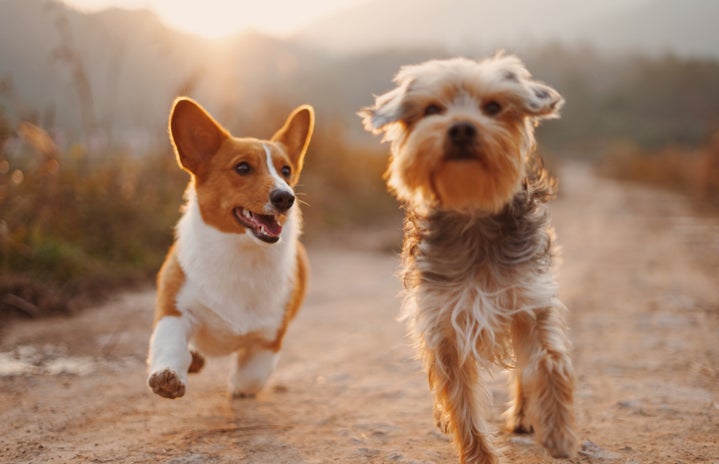This past winter, my dog of eight years unexpectedly passed away. It has been extremely difficult for both my family and I to comprehend and go on living after such a tremendous loss. My dog, a beautiful blonde and white Border Collie named Coco and I shared a life together, we watched each other grow up. I was only eleven years old when she came into my life. Coco was more than a pet to us; she was our best friend and a beloved member of our small tribe. After her death, it was hard to imagine how my life would feel complete again without her. Soon enough, the most mundane activities – like eating, brushing my hair, getting out of bed – felt arduous. I felt like an open wound, spending most of my days sobbing into my hands or on my mother’s shoulder. She comforted me as I cried, reassuring me that it was okay to let it all out. “You’re grieving, it’s only natural,” she’d say to me softly. My mother was right, I was in mourning.
Grief is a normal and universal response to death. When we lose the ones we love, it becomes difficult for us to accept and cope with this new reality. In these moments of sorrow, we need comfort and empathy from those closest to us. Unfortunately – as I and other pet parents have come to discover — pet loss grief is not acknowledged the same way that grieving for humans is and it is treated with less compassion. At the start of this year, the Washington Post consulted experts – such as Leigh Ann Gerk and Jessica Kwerel, pet grief counsellors who explained, “Pet parents often say that losing their animal companions can sometimes be as hard as, if not harder than, losing a human family member.” Yet, people act as though our pets – who become honorary members of our family, are disposable and losing them is a temporary pain that can be cured by getting another family pet. However, this is the furthest thing from the truth. As Annette McGivney wrote in 2021, what the people who told her to move on by getting another pet “didn’t get was that I had lost a soul mate—an irreplaceable relationship—not a piece of property.”
At any given point, dogs can be closer to us than anyone else in our lives. Dogs, well-known as loyal and faithful companions, never stray too far from us and they absorb our routines and some of our habits as their own. “An animal is kind of an extension of you,” says psychologist Dr. Niloo Dardashti. Coco, for example, knew around what time I would wake up and she knew that once I woke up, I would take her for a walk. She learned to predicate my behaviour because of the all the years she’d spent getting to know me. Dogs are also attached to our sides throughout their lives, they go where we go. This makes accepting their deaths much harder because it takes a while to adjust to. Gerk wrote, “your pets follow you into bathroom. They sleep with you. They are your shadow. Human family members don’t do that. Humans don’t go crazy with joy when you come back inside after getting the mail. Human relationships, while important, can be difficult. Our relationship with our pets is simple. They love us just as we are.”
Dogs teach us things too. In the short while that they are around, they teach us the invaluable knowledge of what it means to be a better person. They also teach us unconditional, unwavering love and support – they offer us the kind of love and support you won’t find anywhere else. They sit with us through our heartaches and what makes losing a dog almost ironic and so cruel is that if we had them by our side through this, throughout the mourning process of their loss, it would have been more bearable.
Since Coco’s death, I have come to understand that the grief process is not linear. In fact, it hardly feels like a process. It feels more like a cycle – I’m in mourning, I can’t seem to stop crying. Later, I’m fine, I can move on then I’m reminded of her, and a wave of grief just washes over me. What I mean to say is that there is no single way to grieve, and all that comes with bereavement does not follow a chronological order. I honour Coco in every way that I can. I have recently taken up gardening so that I can spend more time at her grave and take care of it. I still go on long walks like we used to do together. I order her favourite biltong and think of her when I eat it. I’m reminded of her and the beauty she filled my life with wherever I go.
Reading these articles by mental health professionals helped validate my grief because it was then that it dawned upon me that I didn’t just lose my dog, I was losing someone who played such a big part in my life. I was losing someone who had been by my side through thick and thin, watched me become different versions of myself and loved them all – I was losing someone I rushed home to be with, someone whose life was integrated with mine and who my world orbited around. The world keeps turning and time keeps moving forward, but it’s all the same to me. I lost something indispensable, and I can’t have it back. However, I know she lives on in not just my heart but the hearts of everyone who was lucky enough to know her. It was perhaps the greatest privilege to be loved so fervently by such a pure soul. There has been no greater gift to me. The grief is infinite but so is the love.


